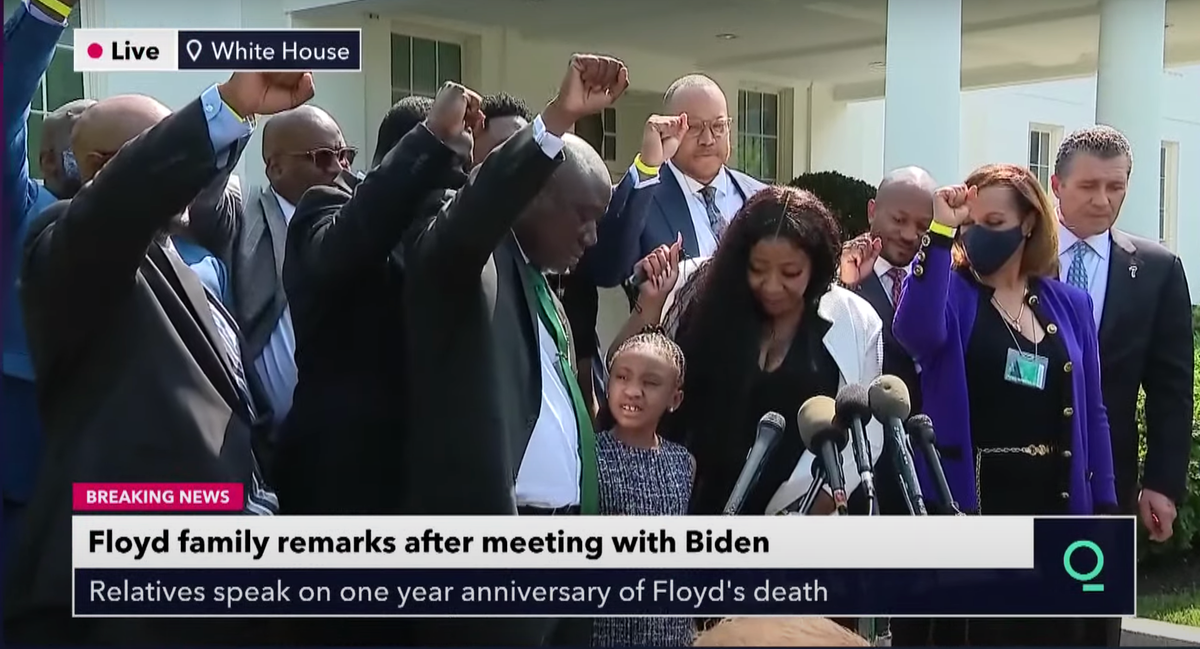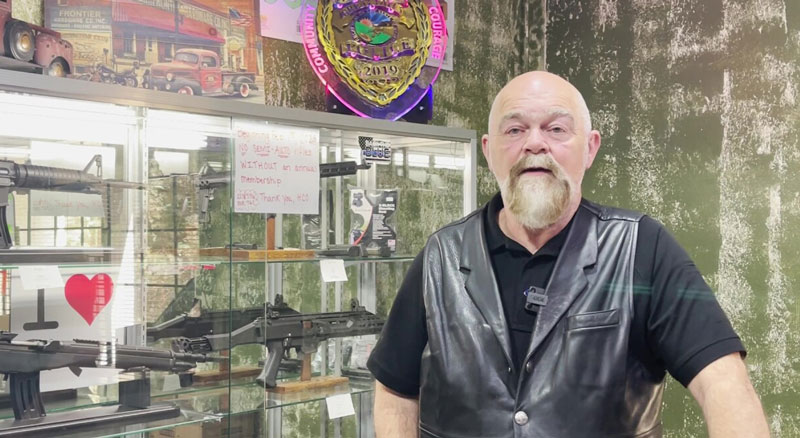George Floyd: Daughter Gianna leads ‘say his name’ chant outside White House after family meets with Biden
George Floyd’s daughter Gianna, 7, led a chant of, “Say his name. George Floyd,” outside the White House on Tuesday, after members of the Floyd family met with president Biden and vice-president Harris on the one-year anniversary of Mr Floyd’s murder at the hands of Minneapolis police.
Brandon Williams, Mr Floyd’s nephew, told reporters that the family had a “great meeting” at the White House, and that they discussed the passage of the George Floyd Justice in Policing Act, which remains stuck in Congress, despite a goal of passing it by the anniversary date.
“[President Biden] said the deadline, he’s not happy about it not being met, but all in all, he wants the bill to be right and meaningful to hold George’s legacy intact,” Mr Williams said.
The president, in a statement released after the meeting, said bigger changes to policing needed to be made than the conviction earlier this year of Derek Chauvin, the former Minneapolis police officer who murdered Mr Floyd during an arrest for a counterfeit $20 bill.
“To deliver real change, we must have accountability when law enforcement officers violate their oaths, and we need to build lasting trust between the vast majority of the men and women who wear the badge honorably and the communities they are sworn to serve and protect,” Mr Biden said. “We can and must have both accountability and trust and in our justice system.”
The vice-president, Kamala Harris, thanked the Floyd family for their “courage, grace, and resilience” in a statement, and called on Congress to finish the passage of the policing act.
“Congress must move swiftly and act with a sense of urgency,” Ms Harris said. “Passing legislation will not bring back those lives lost, but it will represent much needed progress.”
Earlier in the the day, George Floyd’s brother Philonise, who met with Congressional leaders throughout the day, called on Washington to answer the calls for reform that have come from millions across the country since 25 May, 2020.
“We need meaningful legislation,” Mr Floyd said. “We need Joe Biden, we need the Senate to get this taken care of.”
Previously, the president had called on Congress to pass the George Floyd Justice in Policing Act by the anniversary of his death.
The bill, which would create a national registry of police misconduct, ban racial and religious profiling, end no-knock warrants and chokeholds, and overhaul the qualified immunity standard that keeps many officers from being sued, has already passed the House multiple times, albeit with no Republican support.
It remains stuck in the 50-50 split Senate, where 10 Republicans would need to support the bill to break the logjam, but both sides haven’t been able to find a compromise on key provisions like qualified immunity for officers.
A bipartisan group including Republican Senator Tim Scott, Democratic Senator Cory Booker and Democratic US Rep Karen Bass are leading negotiations on a Senate version of the bill.
A compromise bill offered up by Republicans would retain immunity provisions for individual officers and instead allow victims or people alleging police misconduct to sue their police departments.
“One year ago, George Floyd’s murder awakened millions of people around the world who had never before witnessed the deadly consequences of the failures in our policing system,” the three lawmakers said in a joint statement on Monday. “This anniversary serves as a painful reminder of why we must make meaningful change.”
This mixture of momentum and stagnation has played out across much of the country when it comes to police reform since George Floyd was killed. Even though millions of people marched throughout the year calling for sweeping changes to policing – by some estimates, the largest mass movement in US history – those reforms have proved illusive for many.
In Minneapolis, where demonstrators and community members held a moment of silence for George Floyd on Tuesday, a number of policing changes have been made since last year, including tightening use of force standards, banning no-knock raids, and limiting the use of certain riot control weapons. But many in the city want Minneapolis, and in particular its mayor, to go much further, disbanding the Minneapolis department entirely and replacing it with a more holistic public safety agency, a question which could be on the city ballot in November.
At the state level, even though legislatures across the country have passed roughly 140 police reform bills over the past year, and a few more liberal cities have voted to cut police budgets, the Minnesota legislature adjourned its session last week without passing any policing bills, despite recent killings like the shooting of Daunte Wright, an unarmed, 20-year-old Black man killed by police in the Minneapolis suburb of Brooklyn Center during a traffic stop.
“Everybody’s just taking their time on it, and if we continue to take our time and continue to stay silent, I don’t want somebody else’s family to stand here with me,” Katie Wright, Mr Wright’s mother, said outside of the Minnesota statehouse on Monday. “Before it happens to somebody else, somebody has to do something.”
And even if reforms do pass at the federal level, they’re unlikely to have a truly transformative impact on policing and mass incarceration, which are largely driven by state and local law enforcement outside of the direct control of Congress.
According to a recent analysis by The Independent, police have killed at least 426 people of colour since George Floyd was murdered, a rate hardly different from much of the past decade, despite its outpouring of racial justice activism.
Still, ushering through the George Floyd bill would mark a dramatic change in how lawmakers view policing, after decades of gravitating towards “tough on crime” bills like a 1994 law, spearheaded by then senator Joe Biden, which some have blamed for contributing to mass incarceration.




